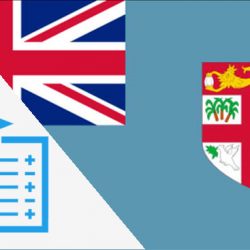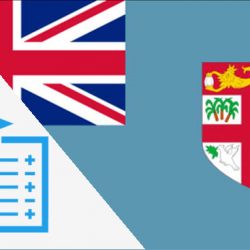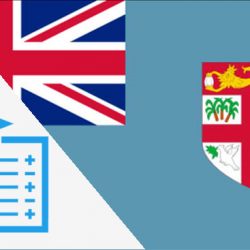Short title
1. This Promulgation may be cited as the Fiji Independent Commission Against Corruption Promulgation.
Interpretation
2. In this Promulgation, unless the context otherwise requires—
“Commission” means the Fiji Independent Commission Against Corruption established under section
3.“Commissioner” means the Commissioner of the Fiji Independent Commission Against Commission
appointed by the President and includes the Deputy Commissioner appointed under section 6. “officer” means an officer of the Commission appointed under section 8 “prescribed officer” means—
a) any person holding an office of emolument, whether permanent or temporary, under the Government; and
b) the following persons (to the extent that they are not persons included in paragraph (a))— (1) any official of the Government appointed by the President or who has sworn an oath of office before the President
(2) Chairman of the Public service Commission
(3) any member of the staff of the Commission
(4) any judicial officer holding a judicial office and any judicial officer appointed by Chief Justice, and any member of the staff of the Judiciary.
“public body” has the meaning assigned to it in section 2 of the Prevention Bribery Promulgation.
“public servant” has the meaning assigned to it in section 2 of the Prevention of Bribery Promulgation.
Offences to which this Promulgation applies
2A This Promulgation applies in relation to—
(a) any offence under this Promulgation;
(b) any offence under the Prevention of Bribery Promulgation;
(c) any offence of corrupt or illegal conduct pertaining to any election;
(d) any offence of blackmail committed by a prescribed officer by or through the misuse of his office;
(e) the offence of perverting or obstructing the course of justice;
(f) the offence of perjury;
(g) to the extent they are not included in paragraphs (e) or (f), any offence contrary to Chapters XI to
XV of the Penal Code;
(h) any offence contrary to Chapters XXIV-XXVII of the Penal Code;
(i) any offence contrary to Chapters XXX-XXXIV;
(j) any offence contrary to Chapter XXXVII of the Penal Code;
(k) any offence contrary to Chapters XXXIX-XLIII of the Penal Code;
(l) the offence of conspiracy to defraud;
(m) to the extent that they are not included in the foregoing paragraphs, the offence of conspiracy to commit any of the offences referred to in this section;
(n) to the extent they are not included in the foregoing paragraphs, any attempt to commit an offence referred to in this section or the offence of aiding, abetting, inciting, counseling or procuring any of those offences.
and in this Promulgation the expression “offence to which this Promulgation applies “shall be construed accordingly”.
(Section 2A repealed and replaced by s.2 of FICAC Promulgation No.28)
(Section 2B repealed by s.3 of FICAC Promulgation No.28)
Establishment of the Commission
3. There is hereby established the Fiji Independent Commission Against Corruption which shall consist of the Commissioner, the Deputy Commissioner and such officers as may be appointed.
Maintenance of the Commission
4. Following consultations with the Attorney-General the expenses of the Commission shall always be met by Government.
Office of Commissioner
5. –(1) The Commissioner shall be subject to the orders and control of President.
(2) The Commissioner shall not be subject to the direction or control of any person other than the President.
(3) The Commissioner shall hold office on such terms and conditions as the President may think fit.
(4) The Commissioner, other than an acting Commissioner, shall not, while he holds the office of the Commissioner, discharge the duties of any other prescribed officer.
(5) The Commissioner may seek the assistance and input of the Attorney-General.
Appointment of Deputy Commissioner
6 The President may appoint a Deputy Commissioner on such terms and conditions as he may think fit.
Acting Commissioner
7 –(1) If the office of the Commissioner is vacant or the Commissioner is absent from duty, the Deputy Commissioner shall, save where the President otherwise directs, act as Commissioner.
(2) If both the Commissioner and Deputy Commissioner is absent from duty, the President may appoint another person to act as Commissioner during that absence.
Appointment of officers
8 –(1) The Commissioner may appoint such officers as the President thinks necessary to assist the Commissioner in the performance of his or her functions under this Promulgation.
(2) (a) Subject to paragraph (b), the Commissioner may, if he is satisfied that it is in the interests of the Commission to do so, terminate the appointment of an officer.
(b) Before terminating an appointment under this subsection—
(i) the Commissioner shall by notice in writing inform the officer concerned that the termination of his appointment is under consideration and the reasons therefore, and
(ii) in the notice such officer shall be given a period of not less than 7 days within which to make, and is hereby authorized to make if he so wishes, written representations to the Commissioner as regards such reasons or as to why his appointment should not be terminated or as regards both.
(c) Where an appointment is terminated under this subsection—
(i) the Commissioner shall notify the officer in writing of the termination; and
(ii) the officer may, within the period of 21 days beginning on the date of notification under subparagraph (i), appeal to the President against the termination.
(d) On an appeal under paragraph (c) the President may confirm or set aside the termination
(e) Where an appointment is terminated under subsection 2(a), the termination shall operate forthwith but if on an appeal under paragraph (c)(ii) the termination is set aside, the officer concerned shall be treated in all respects as if the commissioner had not terminated his appointment.
(3) The terms and conditions of employment of officers shall be subject to the approval of the President, who may vary any terms or conditions imposed by virtue of subsection (4).
(4) Subject to this section and section 11(2), the Commissioner and officers shall be employed subject to Public Service or Government regulations and such administrative rules as apply generally to public officers, except insofar as the application of such Public Service or Government regulation or rules may be modified by standing orders made under section 11(2).
(5) Upon the completion of satisfactory service, all officers of the Commission shall be paid such pension or a benefit similar to a pension scheme, if any, as would be paid to an identically situated person within the Police force by equivalent rank and service and all pre-existing pension rights accrued before joining the Commission shall also be protected and paid as if the provisions pertaining to police officers applied mutatis mutandis.
Warrant card
9 The Commissioner may issue to such officers as he thinks fit a warrant card which shall be prima facie evidence of the officer’s appointment as such.
Power of arrest
10 –(1) An officer authorized in that behalf by the Commissioner may without warrant arrest a person if he reasonably suspects that such person is guilty of an offence under this Promulgation or the Prevention of Bribery Promulgation or any statutory offence of corruption or illegal conduct in relation to any election or, being a prescribed officer, is guilty of an offence to which this Promulgation applies.
(Section 10(1) amended by s.4(a) of FICAC Promulgation No.28)
(Section 10(2) repealed by s.4(b) of FICAC Promulgation No.28)
(3) Any such officer –
(a) may use such force as is reasonable in the circumstances in effecting an arrest under subsection (1); and
(s.10-3(a) amended by s.4(c) of FICAC Promulgation No.28)
(b) may, for the purpose of effecting such an arrest, enter and search any premises or place if he has reason to believe that there is in the premises or place a person who is to be arrested.
(4) No premises or place shall be entered under subsection (3) unless the officer has first stated that he is an officer and the purpose for which he seeks entry and produced his warrant card to any person requesting its production, but subject as aforesaid any such officer may enter any such premises or place by force, if necessary.
(Section 10(5) repealed by s.7(d) of FICAC Promulgation No.28)
Procedure after arrests
10A – (1) A person arrested under section 10 –
(a) may be taken forthwith to a police station and there dealt with in accordance with the Police Act; or
(b) may be taken to the offices of the Commission.
(2) A person arrested under section 10 who is taken to the offices of the Commission may be-
(a) detained there if an officer of the rank of Chief Commission Against Corruption Officer or above considers it necessary for the purpose of further inquiries;
(b) released from custody –
(i) on his depositing such reasonable sum of money as an officer of the rank of Senior Commission Against Corruption Officer or above may require; or
(ii) on his entering into such recognizance, with such sureties, if any, as an officer of the rank of Senior Commission Against Corruption Officer or above may require; or
(iii) on his depositing such a sum of money and entering into such a recognizance.
(3) A person who has deposited a sum of money for the purposes of subsection 2 and has thereupon been released from custody shall –
(a) attend at the offices of the Commission at such time as an officer of the rank of Chief Commission Against Corruption Officer or above has specified and, having so attended shall further attend at such other times thereafter as such an officer may specify; or
(b) appear before a magistrate at such time and place as an officer of the rank of Chief Commission Against Corruption Officer or above has specified.
(3A) A person who has been released from custody under subsection (3) and –
(a) who attends at the offices of the Commission at a further time as shall have been specified;
and
(b) who on such attendance advises an officer of the rank of the Chief Commission Against Corruption Officer or above that he will refuse to attend at any further time, whether specified or not, shall have the sum of money deposited for the purposes of subsection (2) refunded to him and shall not be bound by any recognizance entered into by him with respect to his attendance.
(4) A recognizance entered into for the purposes of subsection (2) shall be conditioned –
(a) for the attendance of the person at the offices of the Commission at such time as may be specified therein and at such other time thereafter as an officer of the rank of Chief Commission Against Corruption Officer or above may specify; or
(b) for the appearance of the person before a magistrate at such time and place as may be specified therein.
(5) If any person fails to attend at the offices of the Commission or to appear before a magistrate in accordance with subsection (3) or a recognizance entered into for the purposes of subsection (2), such sum of money may be forfeited or such recognizance as entreated by a magistrate on application by a Commissioner.
(6) A person who is detained at the offices of the Commission under subsection 2(a) shall be brought before a magistrate as soon as practicable or in any event within 48 hours after his arrest unless he is sooner released under subsection (2)(b) or otherwise.
(7) (a) A person who is detained at the offices of the Commission under subsection (2)(a) may be taken in the custody of an officer to and from any other place if an officer of the rank of Senior Commission Against Corruption Officer or above considers it necessary or desirable to do so.
(b) Any person who is being taken to and from any such place in the custody of an officer under paragraph (a) shall be deemed to be in lawful custody.
(8) The President may by order make such provision as he considers necessary with respect to the treatment of persons detained at the offices of the Commission, whether under subsection
(2)(a) or pursuant to the order of a magistrate.
Arrest of persons granted bail
10AA– (1) An officer authorized in that behalf by the Commissioner may arrest without warrant any person who has been released from custody in accordance with section 10A(2), or otherwise admitted to bail following his arrest under section 10 or his appearance on a summons in respect of an offence referred to in that section –
(a) if the officer has reasonable grounds for believing that any condition on or subject to which such person was so released or otherwise admitted to bail has been or is likely to be broken; or
(b) on being notified in writing by any surety for that person that the surety believes that that person is likely to break the condition that he will appear at the time and place required and for that reason the surety wishes to be relieved of his obligation as surety.
(2) Any person arrested under subsection (1) shall be brought within the period of 24 hours after his arrest or as soon as practicable after the expiry of that period before a magistrate, expect where he was so arrested within the period of 24 hours immediately preceding an occasion on which he is required by virtue of a condition of his release under section 10A(2) or other bail to appear before any court, in which case he shall be brought before that court.
(3) If it appears to the court before which a person is brought under subsection (2) that any condition on or subject to which such person was released or otherwise admitted to bail has been or is likely to be broken, the court may –
(a) remand that person in custody; or
(b) admit that person to bail on the same conditions or on such other conditions as it thinks fit, but if it does not so appear to that court the court shall admit that person to bail on the same conditions.
(4) Nothing in this section shall derogate from or affect any other power of arrest.
Search warrants
10B. Without prejudice to section 17(1) of the Prevention of Bribery Promulgation, if a magistrate is satisfied by information on oath that there is reason to believe that there is in any premises or place anything which is or contains evidence of the commission of an offence to which this Promulgation applies, he may by warrant directed to any officer authorized such officer, and any other officers assisting him, to enter and such premises or place.
(s.10B amended by s.5 of FICAC Promulgation No.28)
Power of search and seizure
10C.- (1) An officer authorized in that behalf by the Commissioner may –
(a) search any person if he reasonably suspects that such person is guilty of an offence to which this Promulgation applies;
(b) search the premises or place in which any person was arrested under section 10, or the premises or place in which a person who evades arrest therein under section 10 was to be arrested, for evidence of any of the offences referred to in that section;
(c) seize and detain anything which such officer has reason to believe to be or to contain evidence of an offence to which this Promulgation applies;
(s.10C-(1)(a)/(c) amended by s.6 of FICAC Promulgation)
(2) A person shall not be searched under subsection (1) except by a person of the same sex.
(3) The power conferred by subsection (1) shall not derogate from the power conferred on any officer by section 17 of the Prevention of Bribery Promulgation or a warrant issued there under.
Power to take finger prints and photographs
10(D)– (1) Where a person has been arrested under section 10 or, has been served with a summons under the provisions of the Magistrate Act in respect of an offence to which this Promulgation applies may take, or cause to be taken under the supervision of an officer, photographs, finger- prints and the weight and height measurements of that person.
(s.10D(1) amended by s.7(a) of FICAC Promulgation No.28)
(2) The identifying particulars of a person taken under subsection (1) may be retained by the Commissioner, except that if –
(a) a decision is taken not to charge the person with any offence; or
(b) the person is charged with an offence to which this Promulgation applies but discharged by a court before conviction or acquitted at his trial or appeal, the identifying particulars, together with any negative or copies thereof, shall as soon as reasonably practicable be destroyed or, if the person prefers, delivered to that person.
(s.10D(2) amended by s.7(b) of FICAC Promulgation No.28)
(3) Notwithstanding subsection (2), the Commissioner may retain the identifying particulars of a person who has been previously convicted of any offence to which this Promulgation applies.
(s.10D(3) amended by s.7(c) of FICAC Promulgation No.28)
(4) In this section –
“ identifying particulars” in relation to a person means photograph, finger-prints and the weight and height measurements of that person;
(s.10D (4) amended by s.7 (d) of FICAC Promulgation No.28)
Standing orders
11- (1) The Commissioner may make orders, which shall be known as Commission standing orders,
providing for –
(a) the control, direction and administration of the Commission;
(b) the discipline, training, classification and promotion of officers;
(c) the duties of officers;
(d) the financial regulation of the Commission;
(e) such other matter as may, in his opinion, be necessary or expedient for preventing abuse or neglect of duty and for upholding the integrity of the Commission.
(2) The Commissioner may, with the prior approval of the President, by standing order modify the application to officers of Public Service or Government regulations or administrative rules applicable by virtue of section 8(4).
(3) No Commission standing order shall be inconsistent with any of the provisions of this Promulgation.
Duties of the Commissioner
12. It shall be the duty of the Commissioner, through the Deputy Commissioner and/or through his officers on behalf of the President to –
(a) receive and consider complaints alleging corrupt practices and investigate such of those complaints as he considers practicable;
(b) investigate-
(i) any alleged or suspected occurrence of an offence specified in paragraphs (a) to (d) of section 2A;
(ii) any alleged or suspected offence of conspiracy to commit any of the offences specified in paragraphs (a) to (d) of section 2A; and
(iii) any alleged or suspected attempt to commit any of the offences specified in paragraphs (a) to (d) of section 2A, or any alleged or suspected offence of aiding, abetting, inciting, counselling or procuring any of those offences.
(s.12 amended by s.8 of FICAC Promulgation No.28)
(c) investigate any conduct of a prescribed officer which, in the opinion of the Commissioner is connected with or conducive to corrupt practices and to report thereon to the President;
(d) examine the practices and procedures of Government departments and public bodies, in order to facilitate the discovery of corrupt practices and to secure the revision of methods of work or procedures which, in the opinion of the Commissioner, may be conducive to corrupt practices;
(e) instruct, advise and assist any person, on the latter’s request, on ways in which corrupt practices may be eliminated by such person;
(f) advise heads of Government departments or of public bodies of changes in practices or procedures compatible with the effective discharge of the duties of such departments or public bodies which the Commissioner thinks necessary to reduce the likelihood of the occurrence of corrupt practices;
(g) educate the public against the evils of corruption; and
(h) enlist and foster public support in combating corruption.
Power of the Commissioner to investigate any offence to which this Promulgation applies
12A The Commissioner may, in addition to any of the any alleged or suspected offences specified in section 12(b), investigate any other suspected or alleged occurrence of an offence to which this Promulgation applies.
Power of the Commissioner to prosecute, etc in his own name
12B– (1) The Commissioner may in his own name and in any court institute and conduct proceedings in relation to any offence to which this Promulgation applies.
(2) The power conferred by subsection (1) includes the power to institute and conduct proceedings in relation to offences that were committed before the commencement of this Promulgation.
(3) The bringing of a prosecution for an offence in the exercise of the power conferred under this section does not, notwithstanding any provision of the Penal Code or any other law to the contrary, require the consent of the Director of Public Prosecutions.
(4) In any court proceedings to which the Commissioner is a party the Commissioner is not required, unless otherwise directed by the court, to appear in person but may appear by his representative.
(New sections 12A and 12B added by s.9 of FICAC Promulgation No.28)
Powers of the Commissioner
13.- (1) For the purpose of the performance of his functions under this Promulgation the Commissioner through the Deputy Commissioner and/or through his officers, may-
(a) authorize in writing any officer to conduct an inquiry or examination;
(b) enter any Government premises and require any prescribed officer to answer questions concerning the duties of any prescribed officer or public servant and require the production of any standing orders, directions, office manuals or instructions relating thereto;
(c) authorize in writing any person to perform any of his duty to exercise such powers under this Promulgation and the Prevention of Bribery Promulgation as he may specify.
(2) The Commissioner or any officer authorized for the purposes of this subsection in writing by the Commissioner shall have the following powers, namely-
(a) as regards the performance of any of the Commissioner’s function under this Promulgation, access to all records, books and other documents relating to the work of any Government department in the possession or under the control of any prescribed officer;
(b) in so far as is necessary for the performance of any of the Commissioner’s function under section 12(d) or (f), access to such records, books and other documents in the possession or under the control of a public body as the Commissioner or such officer reasonably considers will reveal the practices and procedures of the public body; and,
(c) as regards any such records, books and other documents, power to photograph or make copies of them.
(2A) For the purpose of obtaining advice and assistance in relation to the exercise of his powers and the performance of his functions under this Promulgation, the Commissioner may instruct and retain any legal practitioner
(S.13 amended by s.10 of FICAC Promulgation No.28)
(3) In this section “documents” has the meaning assigned to ‘document’ in section 2 of the Prevention of Bribery Promulgation.
Powers of Commission officers
13AA All officers of the Commission shall have, in addition to any power or privileges provided for by this or any other law, the powers and privileges of a police officer of the rank equivalent to that which they hold within the Commission.”
(New section 13AA added by s.11 of FICAC Promulgation No.28)
Resisting or obstructing officers
13A. Any person who resists or obstructs an officer in the execution of his duty shall be guilty of an offence and shall be liable on conviction to a fine of $5000 and to imprisonment for 6 months.
False reports to officers
13B. Any person who knowingly –
(a) makes or causes to be made to an officer a false report of the commission of any offence; or (b) misleads an officer by giving false information or by making false statements or accusations, shall be guilty be guilty of an offence and shall be liable on conviction to a fine $20000 and to imprisonment for 1 year.
Falsely pretending to be an officer, etc.
13C. Any person who falsely pretends(
a) that he is an officer or has any of the powers of an officer under this Promulgation or the Prevention of Bribery Promulgation or under any authorization or warrant under either of those
Promulgation; or
(b) that he is able to procure an officer to do or refrain from doing anything in connection with the
duty of such officer, shall be guilty of offence and shall be liable on conviction to a fine of $20,000 and imprisonment for 1 year.
Disposal of property connected with offences
13D. A magistrate or any other court shall have power to order the disposal of property connected with offences in the possession of the Commissioner or any officer as it applies with respect to property in the possession of a court or the police.
Time limit for prosecution of offences under section 13B or 13C
13E. Notwithstanding any statutory provision prescribing the time limit for the prosecution of any offences a complaint may be made or an information laid in respect of an offence under section 13B or 13C within 1 year from the time when the matter of such complaint or information respectively arose.
Transfer of proceedings from the Commission to the police or the Director of the Public Prosecutions
13F—(1) The conduct of any proceedings being conducted in the name of the Commissioner may, by agreement between the Commissioner and the police or the Director of the Public Prosecutions, be transferred to be conducted in the name of a police officer or the Director of Public Prosecutions (where provision otherwise exists for that matter to be conducted in the name of a police officer or the Director of Public Prosecutions, as the case may be), instead of in the name of the Commissioner.
(2) Where such a transfer in the conduct of proceedings takes place then –
(a) the proceedings shall stand for all purposes as if they had been initiated in the name of the police officer or the Director of Public Prosecutions as the case may be; and
(b) For the purpose of those proceedings or any further proceedings that may be instituted or conducted by the police or Director of Public Prosecutions arising out of the investigation carried out the before the transfer by an officer of the Commission, that investigation shall be regarded as having been carried out by a police officer.
(3) In particular, and without limiting the generality of subsection (2)(b)-
(a) any statement taken from any person by an officer of the Commission shall be regarded as having been taken by a police officer,
(b) any interview of any person conducted or recorded by an officer of the Commission shall be regarded as having been conducted or recorded by police officer;
(c) anything seized or detained by an officer of the Commission shall be regarded as having been seized or detained by a police officer;
(d) any entry or search of any premises or place undertaken by an officer of the Commission shall be regarded as having been undertaken by a police officer;
(e) any arrest made by the officer of the Commission shall be regarded as having been made by a police officer;
(f) any authorization for the searching of any premises or place issued to an officer of the Commission shall be regarded as having been issued to a police officer;
(g) any search of a person undertaken by an officer of the Commission shall be regarded as having been undertaken by a police officer.
(4) Any matter arising from an investigation that has been carried out by an officer of the Commission, whether or not proceedings have been instituted by the Commissioner arising out of that investigation, may be transferred from the Commission to the police or the Director of Public Prosecutions for further investigation, or for consideration as to the institution of criminal proceedings, and subsection 2(b) shall apply in relation to such transferred investigation as it applies to investigations in respect of transferred proceedings.
(5) For the purposes of this section, the transfer of any proceedings being conducted before a court in the name of the Commissioner shall have effect at such time as the court is informed by the Commissioner, the police or the Director of Public Prosecutions that a transfer has been agreed”.
(New section 13F added by s.12 of FICAC Promulgation No.28)
Estimates
14.-(1) In each financial year, before a date appointed by the President, the Commissioner shall forward to the President, for his approval, estimates of the expenditure of the Commission for the next financial year.
(2) The estimates shall be in such form and contain such information as the President may require.
Accounts
15– (1) The Commissioner shall maintain proper accounts of such expenditure by the Commission as the President may require.
(2) As soon as may be convenient after the end of each financial year the Commissioner shall cause a statement of accounts during the previous financial year to be prepared.
Audit
16.- (1) The Auditor General shall at anytime be entitled to have access to all accounts maintained under section 15(1) and he may require such information and explanation thereon as he thinks fit.
(2) The Auditor General shall audit the statement of accounts prepared under section 15(2) and report thereon to the President.
Annual report
17-(1) The commissioner shall, on or before 31 March in each year after 2007, or by such later date as the President may allow, submit to the president a report on the activities of the Commission in the previous year.
(2) The President shall cause the report to be laid on the table of Parliament.
Welfare Fund
17A–(1) There shall be established a fund to be known as the “Fiji Independent Commission Against Corruption Welfare Fund”.
(2) The fund shall consist of –
(a) such donations and voluntary contributions as may be made thereto;
(b) such sums as may, from time to time, voted thereto by Parliament ; and
(c) such sums as may accrue by way of dividend or interest from the investment of the fund or any part thereof.
(3) The fund shall be controlled by the Commissioner and applied to the following purposes- (a) procuring for officers of the Commission and other persons employed by the Commission or for former officers or persons so employed who have ceased employment or retired on pension, gratuity, or other allowance, comforts, conveniences or other benefits not chargeable to the general revenue;
(b) granting loans to officers of the Commission and other persons employed by the Commission or former officers of the Commission and other persons formerly employed by the Commission who have ceased to be employed or retired on pension, gratuity or other allowance;
(c) making grants to persons who were wholly or partially dependent at the time of his death on-
(i) a deceased officer or a deceased former officer of the Commission who had ceased to be employed or had retired on pension, gratuity or other allowance; or
(ii) a deceased person employed by the Commission or a deceased person who was at anytime employed by the Commission and who had ceased to be employed or had retired on pension, gratuity or other allowance, and who are in need of financial assistance, whether towards the payment of funeral expenses of the deceased or otherwise.
Saving of certain common law privileges
18. Nothing in












 We will not leak your personal information
We will not leak your personal information